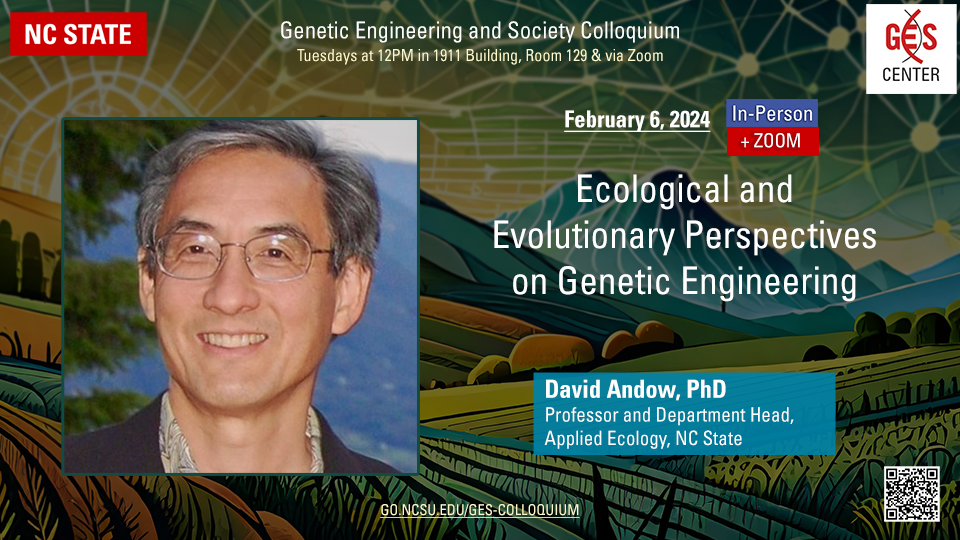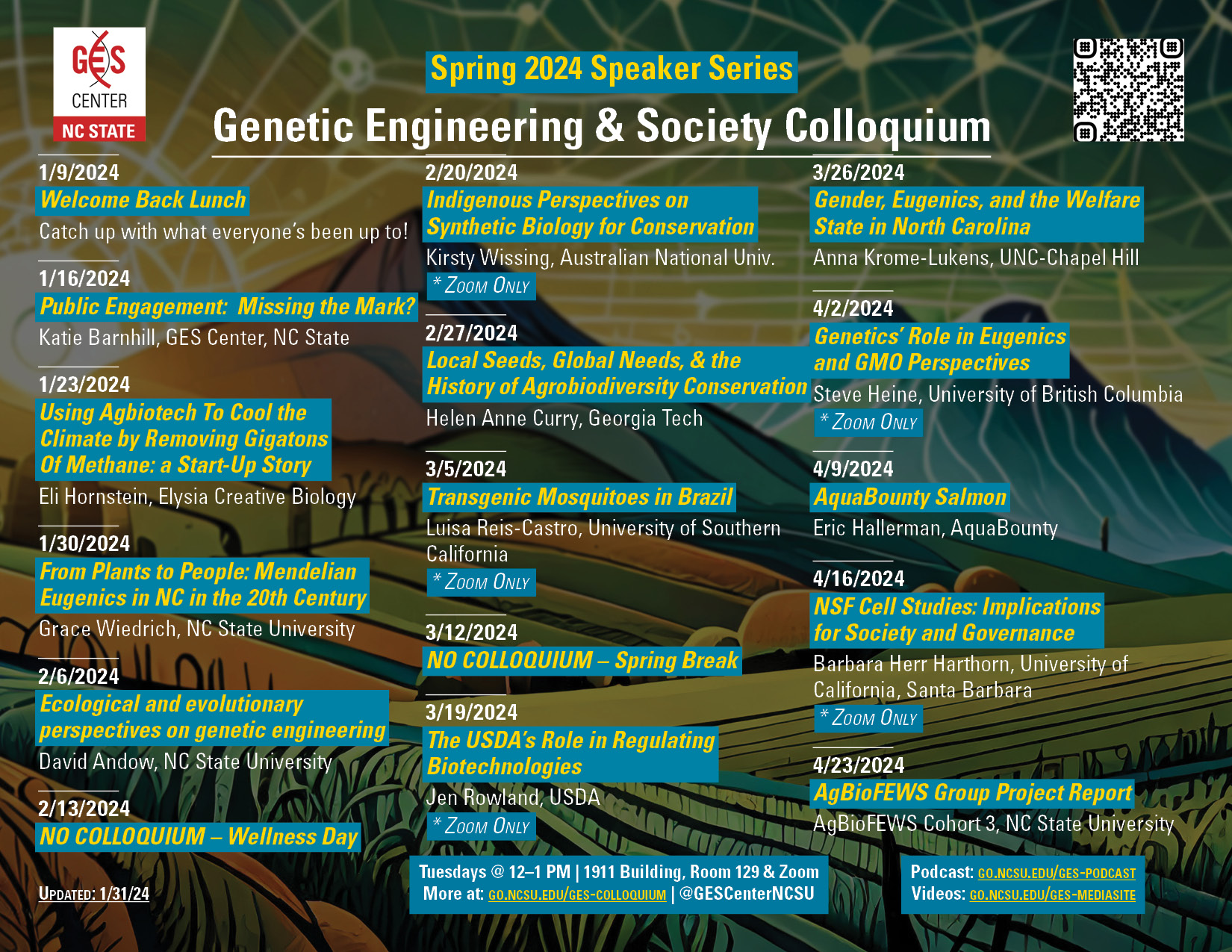
- This event has passed.
David Andow – Ecological and evolutionary perspectives on genetic engineering | GES Colloquium

Colloquium Home | Zoom Registration | GES Video Library (current) | Video Archives | Podcast | @GESCenterNCSU | Newsletter
Ecological and evolutionary perspectives on genetic engineering
David Andow, PhD, Professor and Department Head, Applied Ecology, NC State University | Profile | @NCStateAEC
Ecological and evolutionary perspectives have greatly influenced the development of genetic engineering as exemplified by significant events from history.
Download seminar poster
Abstract
Ecological and evolutionary perspectives have greatly influenced the development of genetic engineering throughout its relatively recent history. I will focus my discussion on key events during the 1980s, 1990s, and 2000s, many of which reverberate today. By 1980, it was clear that commercial applications of genetic engineering would be released into the environment, but it was not clear what organisms would be released. Generic environmental safety arguments flourished, but ecological and evolutionary critiques torpedoed these, and a careful assessment of likely genetically modified organisms (GMOs) prevailed. These resulted in the case-by-case approach to the risks of GMOs that persists today. In the US, it is enshrined in the 1986 Coordinated Framework.
At that time, the focus was on GM microbes, such as ice-minus bacteria and the endophytic bacterium, Clavibacter xyli. Rapid developments in plant transformation, especially maize, completely upended the industry, and in the 1990s, ecological risk assessment shifted accordingly. The exponential increase in the number of releases of GM plants stressed the case-by-case approach, and it was necessary for ecological considerations to address the question of what constitutes a novel case that would require more oversight versus a case similar to one already evaluated. This was also an important contributor to the reopening of non-target evaluations and provided an avenue to implement resistance management in a regulatory context. The 2000s opened with a bang with the Losey, Rayor and Carter 1999 and Quist and Chapela 2001 articles in Nature, which exposed the serious gaps in the ecological risks assessment methods used throughout the world. These gaps present challenges that have yet to be fully resolved today.
Related links:
- Regal, P. J. (1986). Models of genetically engineered organisms and their ecological impact. In Ecology of biological invasions of North America and Hawaii (pp. 111-129). New York, NY: Springer New York.
- Environmental Management, 1986, 10(4), entire issue
- Krimsky, S., Andow, D.A., Doyle, J., Mellon, M., and C. Nader. 1987. Beyond the technical problems of intentional release. In J.W. Gillett (ed.), Prospects for Physical and Biological Containment of Genetically Engineered Organisms. Ecosystems Research Center, Cornell University, ERC-114, pp. 67-74.
- Andow, D.A., S.A. Levin, and M.A. Harwell. 1987. Evaluating environmental risks from biotechnology: Contributions of ecology. In J.R. Fowle III, (ed.), Application of Biotechnology: Environmental and Policy Issues (Westview: Boulder, CO), pp. 125-144.
- Alstad, D.N. and D.A. Andow. 1995. Managing the evolution of insect resistance to transgenic plants. Science 268: 1894-1896.
- Andow, D.A. and D.N. Alstad. 1998. The F2 screen for rare resistance alleles. Journal of Economic Entomology, 91: 572-578.
- Losey, J. E., Rayor, L. S., & Carter, M. E. (1999). Transgenic pollen harms monarch larvae. Nature, 399(6733), 214-214.
- Quist, D., & Chapela, I. H. (2001). Transgenic DNA introgressed into traditional maize landraces in Oaxaca, Mexico. Nature, 414(6863), 541-543.
- Andow, D.A. and A.R. Ives. 2002. Monitoring and adaptive resistance management. Ecological Applications 12: 1378–1390.
Ives, A.R. and D.A. Andow. 2002. Evolution of resistance to Bt crops: Directional selection in structured environments. Ecology Letters 5:792-801. - Haygood, R., A.R. Ives, and D.A. Andow. 2003. Consequences of recurrent gene flow from crops to wild relatives. Proceedings of the Royal Society of London, Series B, 270: 1879-1886.
- Haygood, R., A. R. Ives and D. A. Andow. 2004. Population genetics of transgene containment. Ecology Letters 7: 213-220.
- Hilbeck, A. and D.A. Andow (eds). 2004. Environmental Risk Assessment of Transgenic Organisms: A Case Study of Bt Maize in Kenya. CABI: Wallingford, UK. xvii + 281 pp.
- Andow, D. A. (ed.) 2004. A growing concern: Protecting the food supply in an era of pharmaceutical and industrial crops. Union of Concerned Scientists, Boston, Massachusetts. vi + 125 pp.
- Hilbeck, A., D.A. Andow and E.M.G. Fontes (eds.). 2006. Environmental Risk Assessment of Genetically Modified Organisms: Methodologies for Assessing Bt Cotton in Brazil. CAB International, Wallingford, UK, xx + 373 pp.
- Andow, D.A and C. Zwahlen. 2006. Assessing environmental risks of transgenic plants. Ecology Letters 9: 196-214.
- Andow, D.A., A. Hilbeck and Nguyễn Văn Tuất (eds). 2008. Environmental Risk Assessment of Genetically Modified Organisms: Challenges and Opportunities with Bt Cotton in Viet Nam. CABI Publishing, Wallingford, UK, xx + 360 pp.
- Lövei, G. L., D. A. Andow and S. Arpaia. 2009. Transgenic insecticidal crops and natural enemies: a detailed review of laboratory studies. Environmental Entomology 38(2): 293-306.
- Andow, D. A., G. L. Lövei, and S. Arpaia. 2009. Cry toxins and proteinase inhibitors in transgenic plants do have non-zero effects on natural enemies in the laboratory: Rebuttal to Shelton et al., 2009. Environmental Entomology 38: 1528-1532.
- Andow, D. A. and G. L. Lövei. 2012. Cry toxins in transgenic plants have direct effects on natural enemies in the laboratory. Environmental Entomology 41(5): 1045-47. DOI: doi.org/10.1603/EN11238
Speaker Bio
Ecologist David Andow began his new role leading the Department of Applied Ecology in August last year. He served as a Distinguished McKnight University Professor in the Department of Entomology at the University of Minnesota for 38 years. His research has focused on insect population and community ecology, ecological risk assessment of invasive species and genetically engineered organisms, insect resistance management, and science policy. He graduated magna cum laude with a BS in Biology from Brown University and a PhD in Ecology from Cornell University before completing a post-doc at the National Institute of Agro-environmental Sciences in Japan. He has had long-standing cooperative research with Embrapa in Brazil, where he was for three years before coming to NC State.
GES Colloquium is jointly taught by Drs. Jen Baltzegar and Dawn Rodriguez-Ward, who you may contact with any class-specific questions. Colloquium will be held in person in the 1911 Building, room 129, and live-streamed via Zoom.
Please subscribe to the GES newsletter and LinkedIn for updates.
WordPress database error: [Unknown column 'wp_tec_occurrences.start_date' in 'SELECT']SELECT SQL_CALC_FOUND_ROWS wp_posts.*, CAST( wp_tec_occurrences.start_date AS DATETIME ) AS event_date
FROM wp_posts LEFT JOIN wp_term_relationships ON (wp_posts.ID = wp_term_relationships.object_id) LEFT JOIN wp_postmeta ON ( wp_posts.ID = wp_postmeta.post_id AND wp_postmeta.meta_key = '_EventHideFromUpcoming' ) LEFT JOIN wp_postmeta AS mt1 ON ( wp_posts.ID = mt1.post_id )
WHERE 1=1 AND wp_posts.ID NOT IN (19492) AND (
wp_term_relationships.term_taxonomy_id IN (149,521,802)
OR
wp_term_relationships.term_taxonomy_id IN (45,47)
) AND (
wp_postmeta.post_id IS NULL
AND
( mt1.meta_key = '_EventStartDate' AND CAST(mt1.meta_value AS DATETIME) >= '2026-03-03 13:33:59' )
) AND wp_posts.post_type IN ('post', 'page', 'attachment', 'tribe_venue', 'tribe_events', 'tribe_event_series') AND ((wp_posts.post_status = 'publish'))
GROUP BY wp_tec_occurrences.occurrence_id
ORDER BY event_date ASC, wp_posts.post_date ASC
LIMIT 0, 3
